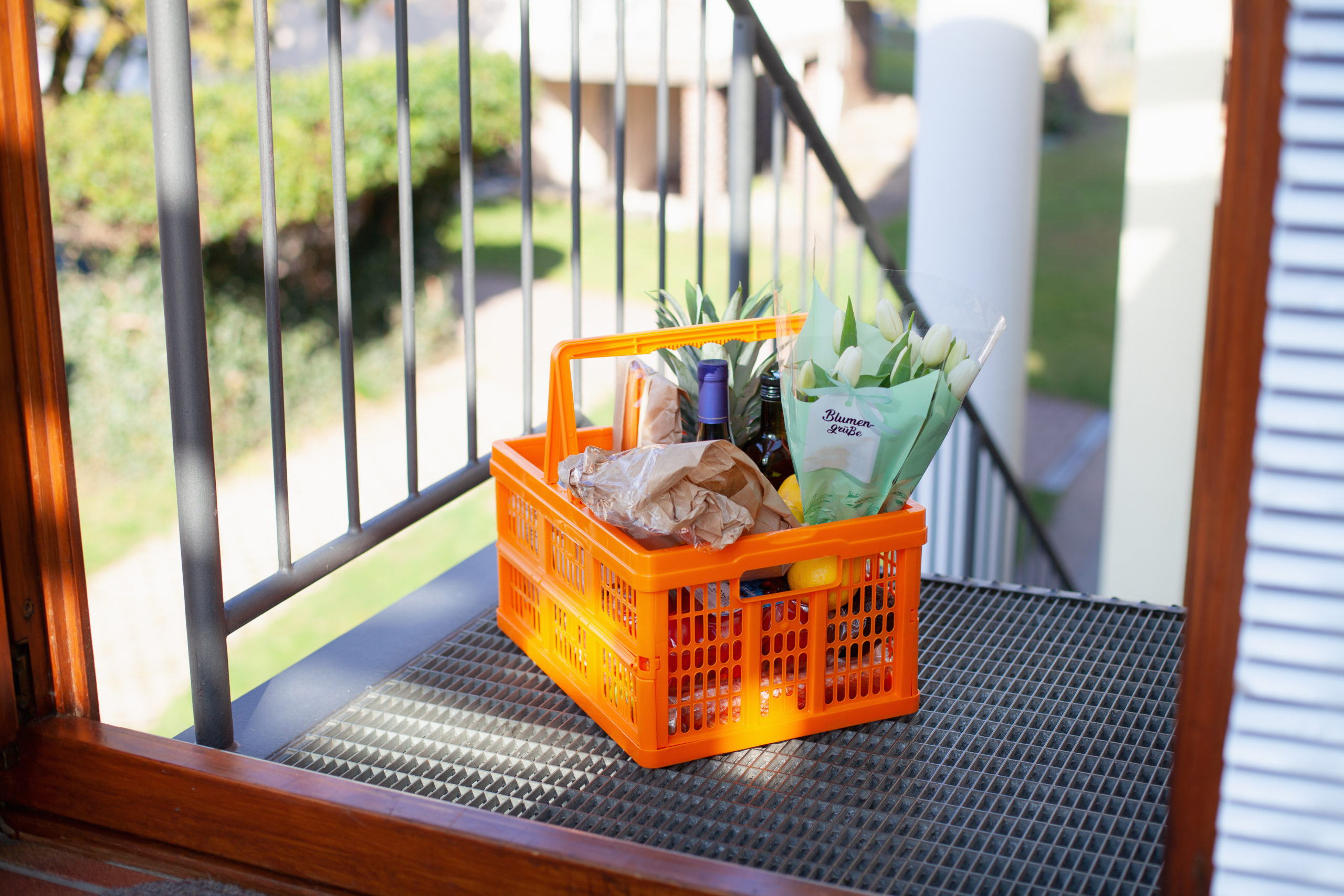The coronavirus outbreak has caused a wave of uncertainty to sweep across the country, with nonessential businesses shutting down in most states and millions of Americans being ordered to stay home as of April 3.
Tasha Holladay Tracy, a real estate agent and co-partner of Homes by the Holladays, a residential real estate company in San Diego, previously wasn’t permitted to work because her industry was considered nonessential. The Cybersecurity and Infrastructure Security Agency has since added residential and commercial real estate services to its list of essential businesses.
Still, Tracy and her husband, who is a professional speaker and business coach, have felt the impact of the coronavirus on their lives. In addition to their lost commissions, Tracy saw her family’s savings dwindling.
“I don’t even know how to ‘tighten the bootstraps’ in a perfect storm like this,” she says.
Getting through this pandemic can feel overwhelming. With many people struggling in situations similar to Tracy’s, you may be wondering how you can lend a hand. Although you might not be able to cover all of your neighbors’ bills, there are small ways you can support your community and help others in their time of need.
1. Order Delivery or Takeout (and Give Bigger Tips)
Christy Sherlock had been a server at an upstate New York restaurant for the past 13 years. As updates on the coronavirus rolled in, the state ordered restaurants and bars to close to dine-in customers on March 16. The following Monday morning, Sherlock’s manager called and told her not to come into work.
“It was a surreal moment,” says Sherlock, who lost an estimated 40% of her household income due to the layoff. She’s currently relying on her husband’s income and their tax refund to stay afloat financially.
In addition to filing an unemployment claim, Sherlock added her profile to tipyourbartender.online, a website that allows people to send tips to bartenders, servers, cooks, and other members of the hospitality industry in New York’s Capital Region who have been affected by the restaurant and bar closures. Tips are sent directly to individual profiles through PayPal or Venmo.
“Even a small tip could mean the world to someone right now,” says Sherlock, who has received tips from a stranger and friends. “Even if your $5 isn’t going to do much towards my bills, the thought behind the act is enough to make me smile (maybe cry) and help me believe that everything is going to be OK.”
How you can help: Many local businesses are relying on their neighbors to help them weather the financial impact of this pandemic. If you’re in a position to place restaurant orders, consider buying a gift card or ordering food online for delivery or takeout. And, when placing your order, tip generously through the food delivery platform so you can support service workers from a distance.
On a broader scale, GoFundMe has set up a dedicated page for small businesses that are actively fundraising on its platform. Check out the many businesses — including restaurants, bars, and coffee shops — that could use your help financially.
2. Donate To Front-Line Health Care Workers
A shortage of personal protective equipment, like surgical masks, is exposing some health care providers and personnel to greater risk as they address the coronavirus outbreak. The Centers for Disease Control and Prevention have issued alternative strategies for health care workers who may not have access to face masks. The CDC’s options include the use of a face shield and even homemade masks, such as a scarf or bandanna, as a last resort.
Some creatives have taken action to help health care workers in their own ways. Jessica Marfa, owner of From Marfa, a handmade leather and home goods store on Etsy, is sewing homemade face masks out of leftover cotton fabric for health care professionals in need.
“Like everyone else, I was feeling pretty lost when all of this started,” says Marfa, who is based in Portland, Oregon.
She learned that her friend, who works at a local emergency room, was asked to use their disposable mask for 30 days. “The next morning, another friend sent me an article about how hospitals needed sewers to volunteer to make masks, and I was in my studio in a matter of minutes,” Marfa says. “For me, being able to help those who are out there risking their lives makes me feel better and maybe gives me a sense [of] purpose.”
After figuring out how to make the masks efficiently, Marfa is now able to produce 20 to 30 face masks per day, and has gained additional volunteers and donations to help her.
“The first batch will be going to a customer of mine who works at a Beaverton Kaiser clinic,” Marfa says. “The next batch is going to New York City for a friend who donated and requested some for her sister’s hospital because they are wearing bandannas currently. After that, I will be giving them to local hospitals.”
How you can help: If you don’t sew, Marfa suggested donating supplies or money to those who are willing to make face masks. There are also GoFundMe efforts to create 3D-printed face shields for health care workers. As of April 3, the “Save Lives w 3D Printed Face Shields” GoFundMe page has raised more than $96,000 from approximately 1,600 donors.
3. Share Extra Groceries or Household Supplies
Essentials have been consistently out of stock at many supermarkets due to shoppers hoarding certain supplies, like toilet paper, during the pandemic. Although stores are generally restocking as quickly as they can, it may be difficult for some people to access these supplies — particularly those who don’t have the means to buy them right away or make it to the store before basic items run out.
How you can help: Are you well-stocked on high-demand household or food items, like toilet paper, rice, dry pasta, or grains? Offer extra supplies to elderly, immunocompromised, or financially strapped individuals who may have a hard time leaving their home or buying these goods.
Of course, make sure to wash your hands and sanitize the items that you’re sharing. Additionally, maintain a distance of at least 6 feet when you deliver supplies.
4. Reach Out To Loved Ones Who Live Alone
Social distancing, isolation, and quarantine can be especially challenging for people who already live alone. Additionally, the response to the coronavirus may have a greater negative impact on those who have preexisting mental health conditions, according to the American Psychological Association. Similarly, individuals who require help from caregivers may face increased difficulty in getting the care they need.
Thanks to available technology, maintaining a long-distance connection — whether it’s with a grandparent who lives far away or a friend who’s struggling to stay positive — is easier than ever.
How you can help: Schedule a recurring time in your calendar to check up on your friends and family members who live alone. With digital meeting platforms like Zoom and even social media apps like Instagram, you can switch up your communication channels and keep in touch with your loved ones for free.
5. Find Out What You Can Do For Friends in Need
Ellen Chang, a Ph.D. candidate living in Seattle, found a creative way to raise funds for her friend who was struggling financially due to the pandemic. Chang’s friend had lost two jobs in early March, with rent and college tuition due at the beginning of April. To start, Chang ordered takeout food for her friend and had groceries delivered.
“I haven’t been able to do much besides trying my best to ‘be there’ for my friend, but then I thought of the propagation projects I have,” Chang says. Her propagation projects are the houseplants that she grows. “[I] thought I could host a plant purge to sell those duplicates I’ve been able to grow as a way to raise money for my friend to help them as much as possible toward the two large expenses coming their way.”
Chang used Facebook to host her plant purge, which is a type of fire sale. She posted photos of plants for sale along with their prices, and participants claimed each plant by responding with “sold.” At the end of the purge, Chang raised just over $900 (after shipping costs and PayPal fees) to help her friend with rent and tuition.
How you can help: Reach out and talk to your friends about what you can do to support their situation. As Chang acknowledges, every friendship is different, so there isn’t one right way to offer assistance.
“The most important thing I can think of is to be as considerate as possible for our friends going through any kind of hardship — being the kindest backup but also giving everyone enough space to breathe,” Chang says. “Support them in ways that not only work for our friends but also work for ourselves.”
The Bottom Line
The coronavirus outbreak — and the world’s response to it — changes on a seemingly day-by-day basis. However, small but meaningful gestures shared among friends, families, and neighbors are positive reminders that we’re in this together.



